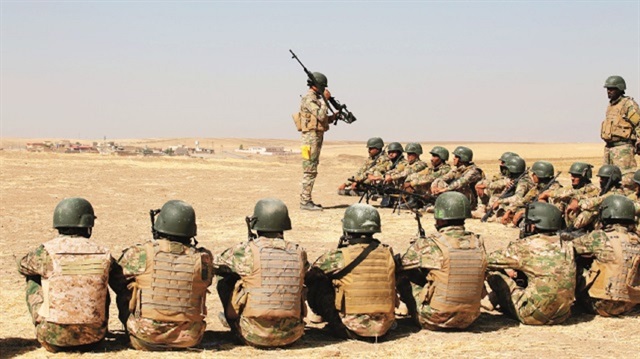
The mission statement of Turkish troops positioned in Bashiqa within the scope of fighting Daesh changes with the illegal referendum in northern Iraq, as they will protect the Ovaköy border gate and bypass Barzani for trade between Turkey and Iraq
The plans for the Ovaköy border gate that will extend through Tal-Afar and Mosul and trap Masoud Barzani in Erbil are becoming clearer. The Ovaköy line, which will take a short time to complete, will deal a blow to Barzani, who held an illegitimate referendum in the Kurdistan Regional Government (KRG) on Sept. 25.
The Turkish military, which will organize a large movement beyond the border, will clear a wide area from Zakho to Faysh Khabur, and from there they will clear a wide area from the Mosul Dam’s west of the Kurdistan Worker’s Party (PKK) and Peshmerga forces.
Ankara will cut the lifeline of Barzani with the closure of the Habur gate and the establishment of the Ovaköy line. Ankara will turn the Bashiqa Military Camp near Mosul into a hub in order to protect the border gates by gearing up military cooperation with the central administration of Baghdad.
After clearing the region from the Peshmerga and the PKK, the 120-kilometer road from Ovaköy's Iraqi entrance to nearby Mosul will be completed within a few months. Within the same project, a bridge will be built in Dicle.
Five separate military camps in Iraq will be directly connected to Bashiqa. The training of Iraqi troops will be conducted there. If necessary, a new base connected to Bashiqa will be established near Tal Afar that will be on the Ovaköy route.
During President Recep Tayyip Erdoğan’s return flight from Serbia, he mentioned two other routes aside from Ovaköy. One of these is the border gate that connects to Iran, most probably the Esendere border gate. If Esendere is actualized in addition to Ovaköy, the capacity of the line will be increased.
The second location Erdoğan drew attention to was Syria’s Azaz, which is a part of the Euphrates Shield region. From here, the line of the border gate will open toward the southeast and reach Deir ez-Zor, and then extend to Baghdad. The plans that will completely bypass Barzani will be finalized during Prime Minister Binali Yıldırım’s visit to Baghdad.
Ankara is expected to administer the merging of the small camps that serve against the PKK in northern Iraq and join them with the Bashiqa camp. The joint plans of Baghdad and Ankara are considered to be a major strategic move against the plans of Zionist Israel.


Turkey has two battalion camps in Zaho in the north of Iraq named Bamerni and Bativa. Apart from these, there is a battalion in Suri, a battalion in Kanimasi, and troops stationed in the Akıncilar region. The Turkish military’s largest presence is in Bashiqa.
The military cooperation between Turkey and Iraq is seen as a guarantee of the trade route from Tel Afar to Ovaköy. Currently, the route is riddled with the Daesh and PKK terrorist organizations as well as the Peshmerga.
Turkey has conveyed to the Iraqi central government that it is ready to construct a 120-kilometer-long stable route to Mosul and a bridge in Dicle. Evaluations of the security of the trade route and the status of Bashiqa have become a prominent topic in the discussions of Yıldırım and his Iraqi counterpart.

“Now Turkey must set a strategy for the camps in the northern Iraq region, and set new targets. This move should be done in coordination with Baghdad to cut off Barzani and rebuke him with redeployments. These camps and the Bashiqa camp can be amalgamated and transformed into a guarantee for the territorial integrity of the region. This is a serious strategic contribution. The security of new trade routes will be ensured; the terrorist formation in the Sinjar region will be annihilated; the PKK-affiliated PYD will be blocked and the terror corridor will be deterred. Therefore, the presence of Turkish troops in northern Iraq, Bashiqa and the Tal Afar region simultaneously is strategic in every respect,” said military sources commenting on the Bashiqa camp restructuring in the Mosul-Tal Afar region.




